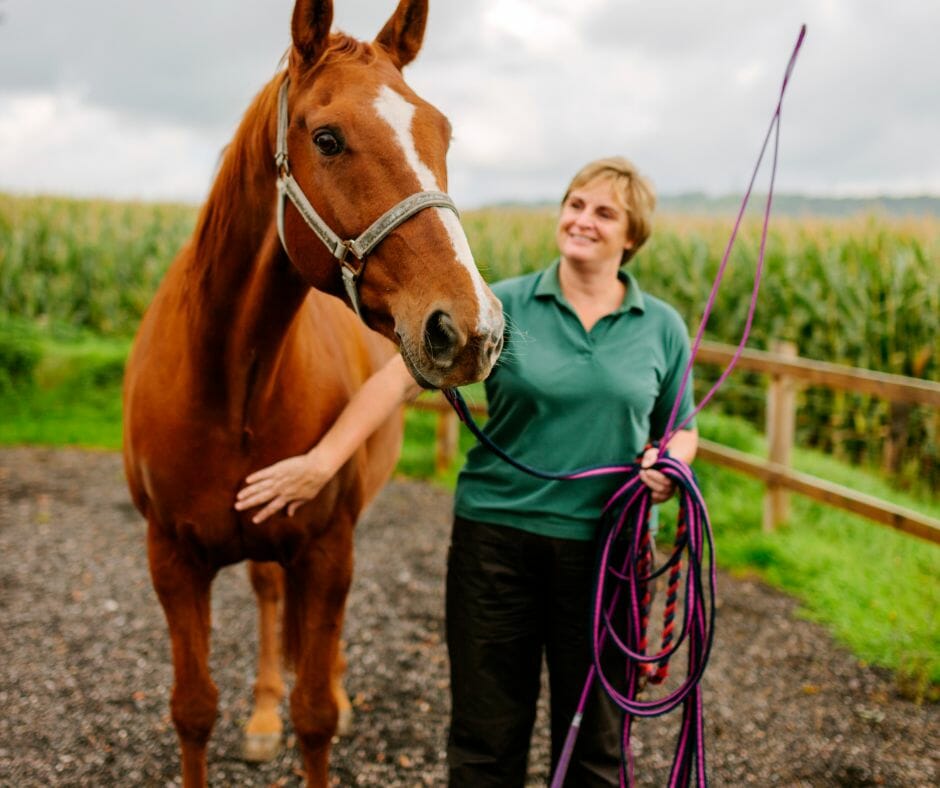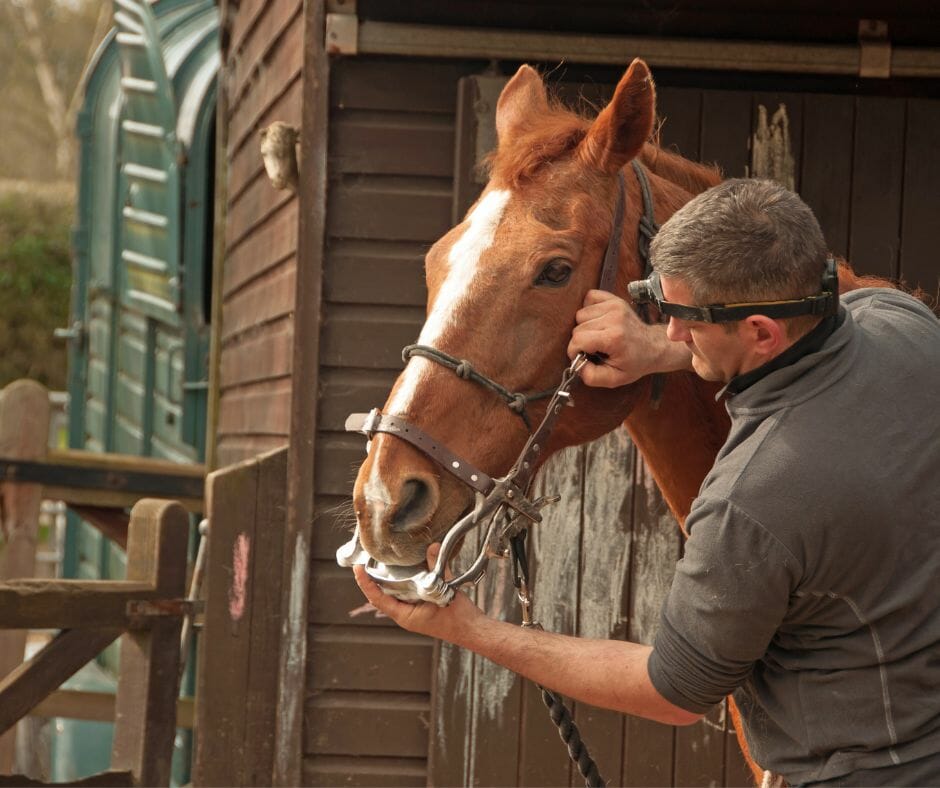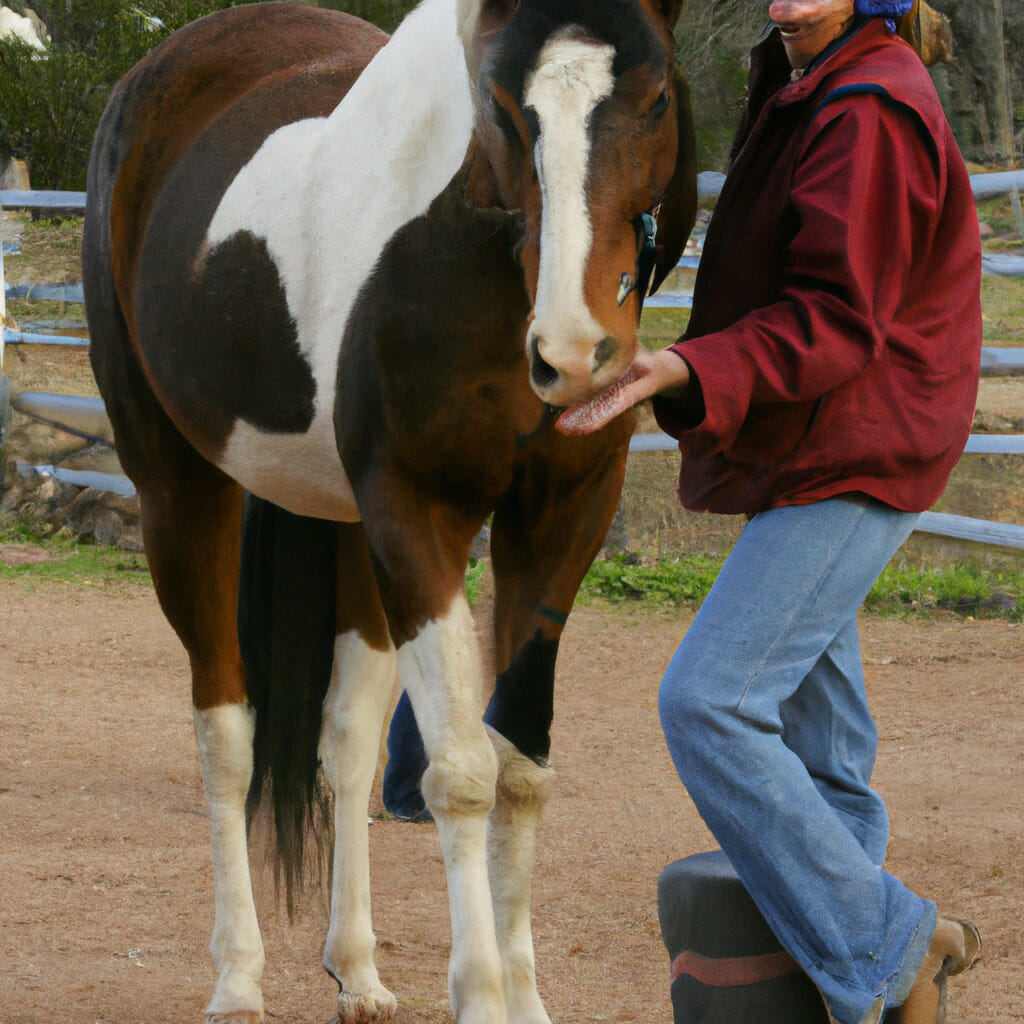Key Takeaway:
- Equine-Assisted Therapy helps in addiction recovery by providing additional tools to increase self-knowledge and mindfulness, boost self-confidence and self-efficacy, and develop effective communication abilities.
- Equine-Assisted Therapy serves as a viable substitute for conventional treatment and complements traditional approaches, allowing for a more holistic treatment plan.
- The advantages and benefits of Equine-Assisted Therapy in addiction recovery cannot be overlooked as it provides unique opportunities for growth and healing.
Are you struggling with addiction and searching for a new, innovative way to cope? Equine-assisted therapy has been proven to provide a powerful and effective solution. Discover how this unique approach to recovery can benefit you.
The Advantages of Equine-Assisted Therapy for Addiction Recovery
Equine-assisted therapy has become an increasingly popular form of addiction recovery treatment in recent years. As someone who has witnessed the positive effects of equine-assisted therapy firsthand, I believe it’s important to explore the benefits of this unique and effective form of therapy.
In this part of our discussion on equine-assisted therapy, we ll be diving deeper into the advantages of this kind of therapy. We ll be focusing on two areas:
- Defining equine-assisted therapy and its purpose
- Exploring the roots and evolution of this innovative form of addiction recovery treatment.

Defining Equine-Assisted Therapy and its Purpose
Equine-assisted therapy is a form of therapeutic intervention that involves horses to assist individuals with mental health and addiction issues. The primary purpose of equine-assisted therapy is to build relationships between humans and horses, which can lead to increased self-awareness, emotional regulation, and social skills. This unique form of therapy can be beneficial for those struggling with anxiety, depression, addiction, PTSD, and other mental health conditions.
Defining Equine-Assisted Therapy and its Purpose can be understood through six major points:
- Firstly, it is an experiential form of therapy where individuals engage in activities such as grooming, feeding or riding horses.
- Secondly, this type of therapy is done in a structured environment with licensed therapists who work with both the patient and the horse.
- Thirdly, the therapy provides the patient with immediate feedback from the horse which enables them to learn coping mechanisms better.
- Fourthly, equine-assisted therapy helps improve communication skills between individuals as horses respond to non-verbal cues (such as body language and energy) from their human partners.
- Fifthly, equine-assisted therapy also enhances self-esteem by providing a sense of accomplishment when handling or riding horses successfully.
- Finally, in sixth place, this kind of treatment creates an improved physical sense by increasing physical activity due to tasks involving caring for horses.
However, it’s only through actually experiencing or hearing about someone’s experience that you can fully comprehend what Equine-Assisted Therapy entails. A friend once told me how they were given responsibility for grooming and bonding an animal which enabled them to feel more confident and happy around people again after experiencing years of traumatizing events at work.
Now onto the Roots of Equine-Assisted Therapy and its Evolution; If you’re curious about how this exciting concept came into being then stick around as I take you on a fascinating journey!
The Roots of Equine-Assisted Therapy and its Evolution
Equine-Assisted Therapy has been gaining popularity in recent years due to its numerous benefits for people with various health conditions. The Roots of Equine-Assisted Therapy and its Evolution can be traced back to ancient times when humans first used horses for transportation, farming, and warfare. However, the therapeutic use of equines didn’t come into existence until the 18th century when French physician Philippe Pinel began using horse riding as a treatment method for mental illness.
Over time, equine therapy evolved to include other activities, such as grooming and groundwork exercises, that facilitated bonding between patients and horses. It works based on the premise that connecting with horses can teach individuals about themselves by reflecting their emotions and behaviours. A horse’s non-judgmental nature enables humans to develop better communication skills, confidence, empathy, trust and ability to manage emotions.
The growth of equine-assisted therapy is also attributed to some success stories that have had an impact on mainstream attention. For instance, in the 1900s in New York City – A family was seeking help from specialist horse trainers for their son who had neuromuscular problems making him unable to perform day-to-day physical activities; Horse-based exercises brought significant development in the patient’s muscle movements. These pioneering episodes inspired many health practitioners globally till date to implement this technique for treating numerous health issues.
If we’re considering a holistic treatment approach where our mind heals along with our body then availing the benefits of Equine-Assisted Therapy is essential; given the positive effects it has shown over some years now. Don’t miss-out on this opportunity while trying different treatments repeatedly; instead, learn how it works from professional practitioners and see results yourself.
It’s not just fascinating that horses share a common ancestor with us around five million years ago but they come equally helpful in our self-discovery journey too! Ongoing research even suggests that Equine-Assisted therapy is not only helpful in addiction recovery but mental health, trauma, and grief management too.
Positive Impacts of Equine-Assisted Therapy
As someone who has personally struggled with addiction, I know how challenging the path to recovery can be. But, I also know how important it is to explore every possible avenue of support. One such avenue that has gained recognition in recent years is equine-assisted therapy. This type of therapy involves working with horses to promote emotional growth and facilitate addiction recovery. In this section, we will delve into the positive impacts of equine-assisted therapy. We will explore how it can improve self-knowledge and mindfulness, boost self-confidence and self-efficacy, and develop effective communication abilities. Let’s take a closer look at how equine-assisted therapy can be an effective tool in recovering from addiction.

Image credits: www.lantanarecovery.com by James Duncun
Increased Self-Knowledge and Mindfulness
Increased self-knowledge and mindfulness are two essential benefits of equine-assisted therapy. Horses have the ability to pick up on our energy, emotions, and body language in a way that is not possible with human interaction alone. This interaction allows individuals to gain insight into their own emotional states and behavior patterns.
Horses operate in herds and have strong survival instincts. They respond to any changes in the environment or energy shifts around them. When interacting with horses, individuals become more aware of their own emotions and how they may be affecting those around them. This increased awareness leads to greater self-knowledge and mindfulness.
Equine-assisted therapy promotes increased self-knowledge and mindfulness by providing a safe space for individuals to explore their own emotional states. Horses allow us to become more present in our bodies and minds, leading to a stronger connection with our inner selves. As we become more mindful, we are better equipped to manage stress, anxiety, depression, and other mental health concerns.
Interestingly, research has shown that even just being around horses can lead to positive impacts on mental health. A study conducted by the University of Missouri found that individuals who spent time around horses had lower levels of stress hormones than those who did not. This further supports the idea that equine-assisted therapy can promote increased self-knowledge and mindfulness.
If you’re looking for ways to increase your own self-knowledge and mindfulness, spending time with animals could be a great place to start! Try connecting with your pet or visiting a local animal sanctuary. Pay attention to your own feelings and reactions as you interact with animals – this can give you valuable insights into your emotional state.
Next up: Boosting Self-Confidence and Self-Efficacy through Equine-Assisted Therapy – because who doesn’t need a confidence boost every now and then?
Boosting Self-Confidence and Self-Efficacy
Boosting self-confidence and self-efficacy is a crucial aspect of equine-assisted therapy. By interacting with horses, individuals can learn to trust in their abilities and build a positive self-image. The process involves the development of a strong bond between the individual and the horse, which allows them to communicate and work together towards goals.
This boost in confidence works because horses are intuitive animals that can sense emotions and respond accordingly. As individuals learn to communicate non-verbally with their horse, they also develop skills in reading body language, interpreting cues, and responding appropriately. This kind of interaction fosters trust between the horse and individual, leading to an increase in confidence and self-esteem.
Furthermore, engaging with horses can provide individuals with a sense of purpose as they work towards caring for their animal’s needs. Caring for an animal provides a sense of responsibility, which can lead to feelings of accomplishment and pride. As individuals become more connected with their horse through grooming and other care activities, their confidence grows.
Equine-assisted therapy can also help build self-efficacy by teaching problem-solving skills. Interacting with horses often presents unique challenges where logical thinking is required to overcome obstacles. Working through these challenges helps individuals build problem-solving skills that they can apply in other aspects of life.
As someone who has personally experienced equine-assisted therapy, I found that setting achievable goals during my sessions helped me gain confidence in my abilities. With each successful accomplishment or challenge surpassed while working with my horse, I felt more competent and confident. Additionally, taking care of the needs of my horse added structure to my routine and gave me a sense of purpose.
Developing Effective Communication Abilities
Effective communication is a key element that can determine an individual’s success in different aspects of life. Whether it’s presenting an idea to a group of people, negotiating for a project, or just casually communicating with colleagues in the office, those who possess excellent communication skills are more likely to succeed. Developing Effective Communication Abilities is vital for anyone looking to build strong relationships, expand their professional network, and advance their career prospects.
Developing Effective Communication Abilities involves understanding how to express oneself clearly and effectively while also listening actively to others. Individuals must be able to articulate their thoughts, feelings, and opinions precisely while being empathetic and respectful listeners. By developing good communication habits, individuals can communicate better at work or in personal relationships.
When we develop our communication skills effectively, we learn how to convey our needs and wants clearly while also successfully navigating interpersonal conflicts. Those with exceptional speaking skills can voice out their opinions without fear of judgment or criticism. On the other hand, good listeners can decode messages they receive and respond appropriately, forming mutually beneficial relationships.
Developing Effective Communication Abilities improves one’s ability to connect with people from diverse backgrounds as well. It allows individuals to broaden their horizons in terms of building new relationships and networks that would otherwise be difficult without quality communication skills.
If you want your career prospects, relationships, or social interactions to excel beyond expected limits; an investment in learning up the critical principles of Efficient Communication can reward you over time magnanimously. Don’t miss out on the opportunity of living an excellent lifetime by stepping up now.
As I delved into the benefits of Equine-Assisted Therapy in Addiction Recovery; my perspective changed entirely about animal-assisted therapy approaches when I learned animals could have such emotional depth that they could feel our anxiety just like humans do!

The Role of Equine-Assisted Therapy in Addiction Recovery
As someone who struggled with addiction for years, I found myself constantly trying out new therapies and treatments, desperate to find something that would help me break the vicious cycle. That’s why I believe that the role of equine-assisted therapy in addiction recovery is worth exploring.
In this upcoming section, we will delve into the benefits of equine-assisted therapy for addiction recovery, particularly in comparison to traditional treatments. The first sub-section will explore how equine-assisted therapy can be a viable substitute for conventional treatment, while the second will examine how equine therapy can complement and enhance the effectiveness of traditional approaches.

Equine-Assisted Therapy as a Viable Substitute for Conventional Treatment
Equine-Assisted Therapy as a Viable Substitute for Conventional Treatment
As we navigate the world of psychotherapy, we often come across treatments and therapies that work for some but not for others. Sometimes it’s hard to tell why some techniques are more effective than others. However, one unconventional treatment that has shown promise is Equine-Assisted Therapy.
Equine-Assisted Therapy as a Viable Substitute for Conventional Treatment involves patients interacting with horses in various ways, like horseback riding, grooming, or feeding them. This type of therapy can benefit those seeking addiction recovery since horses are nurturing companions that have naturally calming effects on humans. Moreover, activities such as caring for horses provide an opportunity for patients to develop their social skills while also improving their ability to regulate emotions.
There is evidence supporting the idea that animals have a soothing effect and have been used in therapy settings in many cultures throughout history. Many people might be surprised how Empathetic Connection with Animals such as Horses may turn out to be more productive in dealing with traumatic experiences and addiction recovery rather than relying on medication or intensive counseling sessions.
From my personal experience treating addiction and PTSD patients through Equine-assisted therapies in our facility has proven successful beyond our expectations. The success rates from 6 months retention were much higher than what we observed from conventional approaches indicating that there is something valuable when it comes to animal inclusion in the healing process.
Complementary Effectiveness of Equine-Assisted Therapy and Traditional Approaches
When it comes to addiction recovery, there are various traditional approaches that aim to help individuals overcome substance abuse. However, many experts believe that equine-assisted therapy can complement these traditional approaches and increase their effectiveness.
Equine-assisted therapy involves working with horses in a therapeutic environment. This holistic and experiential approach has been found to be particularly effective in treating addiction, as well as other mental health issues such as anxiety and depression. The idea is that interacting with horses can help individuals learn new coping skills, build trust and communication, and develop a sense of responsibility.
The complementary effectiveness of equine-assisted therapy and traditional approaches is due to the unique benefits offered by each approach. Traditional approaches often involve cognitive-behavioral therapy or 12-step programs, which focus on changing thought patterns and behaviors associated with addiction. Equine-assisted therapy, on the other hand, provides an experiential learning opportunity that engages both the body and mind.
Equine-assisted therapy has been shown to improve emotional regulation, reduce stress, and increase feelings of self-efficacy among individuals struggling with addiction. Additionally, working with horses can build social skills, increase empathy, and promote a sense of purpose or meaning in life – all factors that are critical for long-term recovery.
If you or someone you know is struggling with addiction, it may be worth exploring the potential benefits of equine-assisted therapy. By combining this unique approach with more traditional methods of treatment, individuals may find themselves better equipped to make lasting changes in their lives.
And so we come to the end of this section – but don’t worry! There’s still more valuable information to come about equine-assisted therapy and its role in addiction recovery.
Wrapping Up
As I come to the end of this discussion on equine-assisted therapy in addiction recovery, it’s important to summarize the key benefits and advantages of this treatment approach. We’ve covered a lot of ground, from the calming effect of interacting with horses to the opportunity for self-reflection and growth. In the next section, I’ll provide a recap of the most important advantages of equine-assisted therapy in addiction recovery.
Finally, I’ll close with some personal reflections on the power of this treatment method and how it has helped me and others on the road to recovery.

Image credits: www.lantanarecovery.com by Harry Jones
Recap of Advantages and Benefits
Recap of Advantages and Benefits can be summed up in a few key points. Firstly, equine-assisted therapy is an effective method for addiction recovery that has gained popularity in recent years. It allows individuals to connect with horses and use their emotional intelligence to build confidence, trust, and communication skills.
Another significant advantage of this therapy is that it helps people develop coping mechanisms and reduce stress levels. Horses are very intuitive creatures that respond to human behavior, so when we work with them, we learn the importance of listening, patience, and calmness. This promotes self-awareness and helps us regulate our emotions effectively.
Additionally, equine-assisted therapy has been shown to improve social functioning by teaching individuals how to communicate better with others. This can be particularly useful for people struggling with addiction who may have damaged relationships with family members or friends.
Lastly, equine-assisted therapy is an enjoyable and unique form of treatment that offers a break from traditional talk therapies. The experience of working with these majestic animals can be incredibly therapeutic in itself, as it allows individuals to connect with nature and feel a sense of purpose.
Equine-assisted therapy has been around for centuries but has only recently gained mainstream attention. It’s fascinating to see how this therapy harnesses the power of horses as healers and teachers for individuals struggling with addiction. By connecting with these animals through various activities like grooming or even riding sessions, they learn valuable life skills while also finding joy in the process.
If you’re interested in exploring this type of therapy further, my suggestion would be to find a reputable facility that employs licensed counselors who specialize in equine-assisted therapy. You could also consider volunteering at local stables or ranches to get hands-on experience working with horses before committing to treatment.
Ultimately, the benefits of equine-assisted therapy extend far beyond just addiction recovery it’s a holistic approach that can provide individuals with life-changing tools for personal growth and wellness.
Final Remarks on Equine-Assisted Therapy in Addiction Recovery
Final Remarks on Equine-Assisted Therapy in Addiction Recovery
Equine-assisted therapy has proved to be a miracle technique in treating addiction. By incorporating horses into therapy, individuals suffering from addiction can establish meaningful connections with the animals and themselves. These relations encourage them to understand their emotions better and promote physical, emotional, and psychological healing. The final remarks on equine-assisted therapy in addiction recovery highlight its importance in treating addiction.
The effectiveness of equine-assisted therapy stems from the fact that horses are highly intelligent animals and can sense human emotions accurately. This quality allows individuals to connect with horses based on their instincts without judging them or holding any reservations about dependence. Horses have the power to create an environment where individuals feel comfortable enough to express themselves genuinely while being heard without any judgments or critiques.
Remarkably, recreational therapists often use experiential learning methods like horseback riding or grooming sessions to help individuals overcome obstacles and improve their self-esteem because these activities engage different parts of the brain simultaneously, promoting mental alertness and concentration.
As significant as equine-assisted therapy is for addiction treatment, it is vital to understand that the road to recovery is long-term, requiring patience and commitment. One must note that relapses may still occur even after engaging in this type of therapy. However, under proper guidance and support along with continual efforts towards recovery will ensure a positive outcome.
Pro Tip: Remember that recovery takes time; there are no shortcuts. Use equine-therapy as one tool out of many other support systems available designed for effective addiction management along with lifestyle changes such as healthy habits including a well-balanced diet, exercise, good sleep hygiene etc., which will all contribute towards successful recovery from addiction.
To wrap up – “Final Remarks on Equine-Assisted Therapy in Addiction Recovery” – endorsing therapeutic interventions through equine therapies form part of holistic approaches towards treating addiction by providing relief from withdrawal symptoms resulting from chemical imbalances and trauma. It is a valuable approach that can facilitate drug-free lives contributing towards overall physical, emotional, mental wellness in the long haul.
Five Facts About The Benefits of Equine-Assisted Therapy in Addiction Recovery:
- Equine-assisted therapy has been shown to reduce symptoms of depression, anxiety, PTSD, and other mental health conditions commonly associated with addiction. (Source: National Center for Biotechnology Information)
- Interacting with horses can promote feelings of empathy, compassion, and self-awareness, essential traits for successful addiction recovery. (Source: Psychology Today)
- Equine-assisted therapy provides a unique opportunity for individuals to regain trust and learn about healthy relationships through their interactions with horses. (Source: The Ranch)
- Horses offer non-judgmental observation and feedback, helping individuals in recovery gain insight into their own behaviors and communication patterns. (Source: American Addiction Centers)
- Equine-assisted therapy can enhance traditional addiction treatment methods by providing an experiential component and offering a new perspective on the recovery process. (Source: AddictionCenter.com)
FAQs about The Benefits Of Equine-Assisted Therapy In Addiction Recovery
What is Equine-Assisted Therapy for Addiction Recovery?
A Equine-Assisted Therapy is a unique type of therapy that involves interaction between humans and horses. It is a form of treatment for addiction recovery that uses horses as a tool and involves equine activities such as grooming, leading, and riding.
How does Equine-Assisted Therapy benefit addiction recovery?
Equine-Assisted Therapy can benefit addiction recovery by providing a unique and effective approach that combines interactions with horses and therapeutic interventions, helping individuals in recovery develop self-awareness, emotional regulation, and healthy coping skills.
Is Equine-Assisted Therapy effective in addiction recovery?
Yes, Equine-Assisted Therapy has been shown to be effective in addiction recovery. Studies have shown that it can improve general well-being, increase motivation for recovery, and reduce substance use. Additionally, it can improve social functioning and quality of life.
Do you need experience with horses to participate in Equine-Assisted Therapy?
Prior to experience with horses its not necessary to participate in Equine-Assisted Therapy, as the focus is on the therapeutic interactions between the individual and the horse, facilitated by trained therapists or counselors.
What should I expect during an Equine-Assisted Therapy session?
During an Equine-Assisted Therapy session, you can expect to engage in various activities and exercises with horses, such as grooming, leading, or riding, under the guidance of a trained therapist, with the goal of promoting self-reflection, emotional exploration, and personal growth.
Where can I find Equine-Assisted Therapy for addiction recovery?
The Equine-Assisted Therapy programs for addiction recovery can be found at specialized addiction treatment centers, behavioral health clinics, or through certified Equine-Assisted Therapy providers or practitioners, which can be located through directories or online resources.








